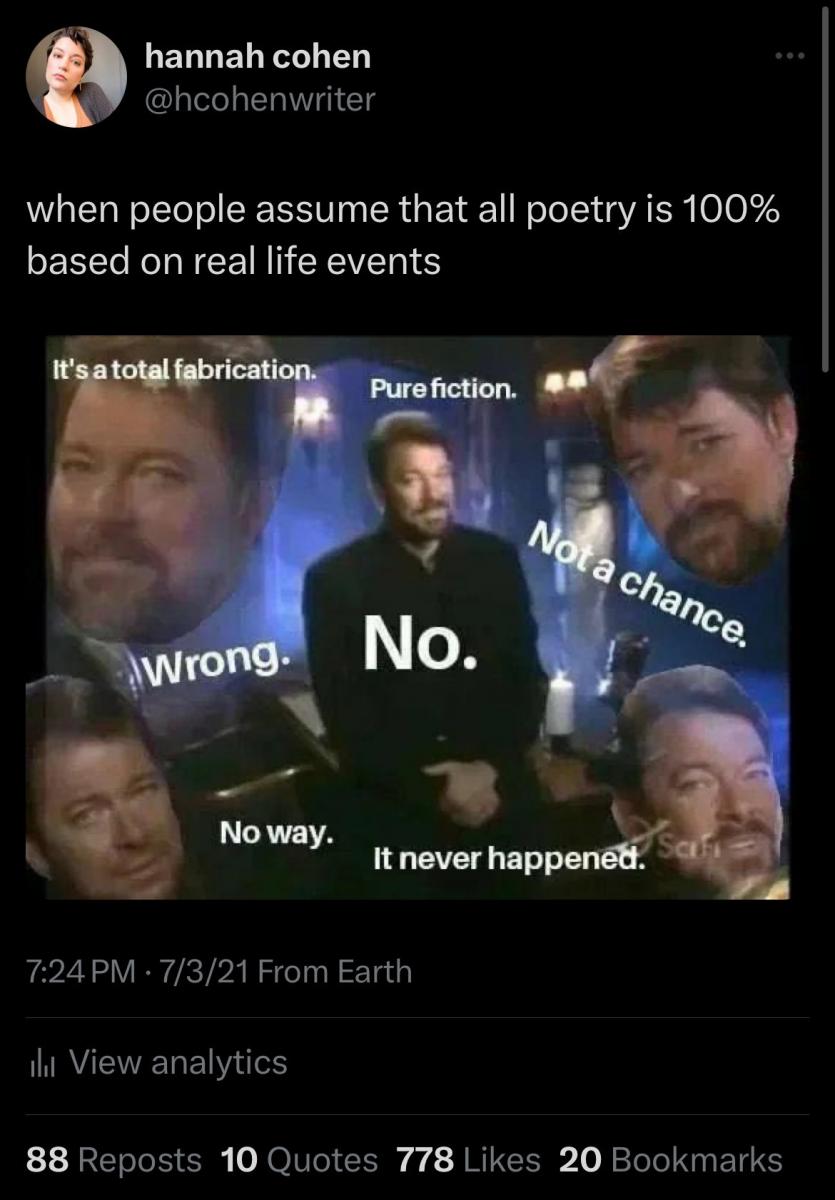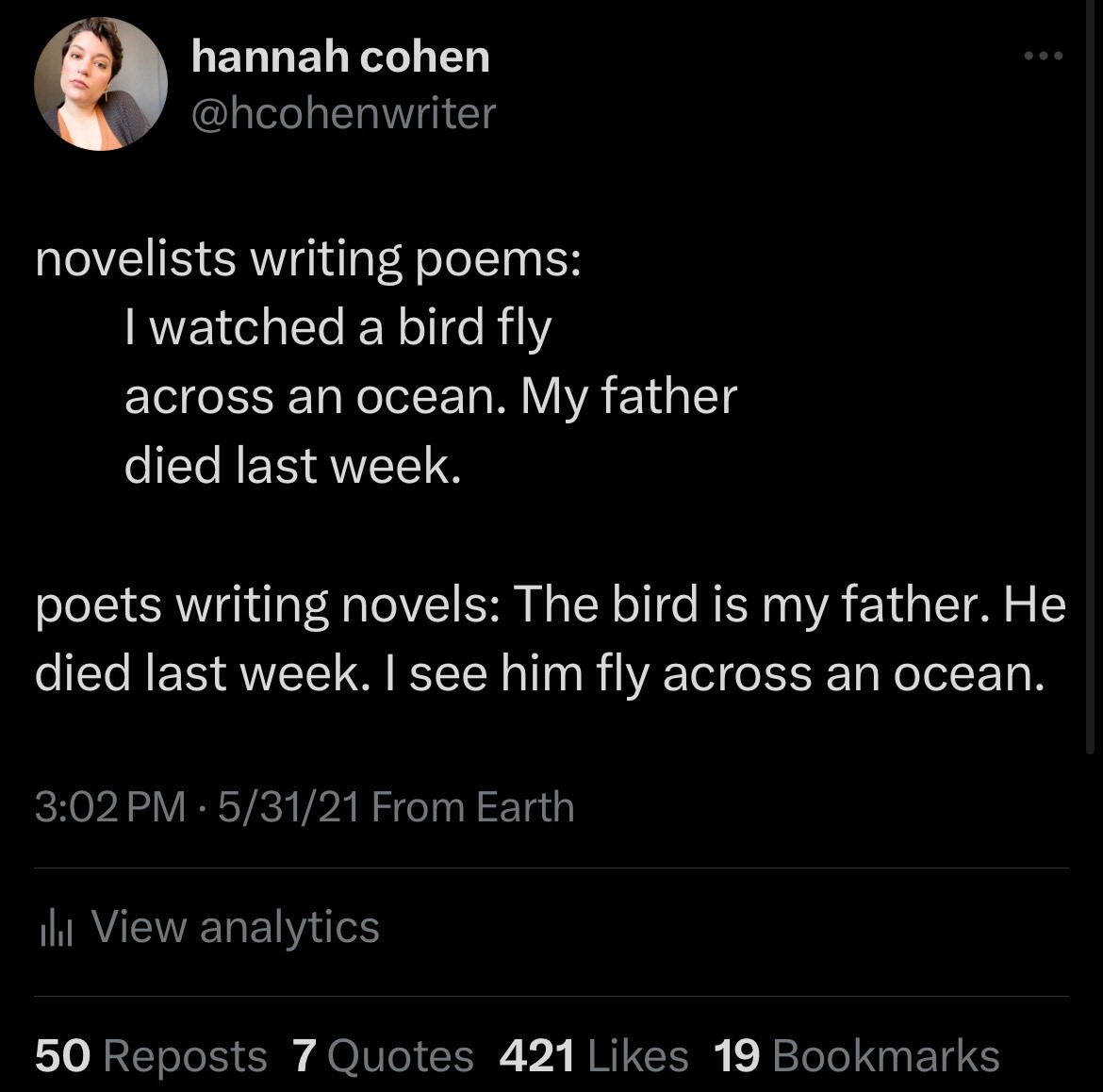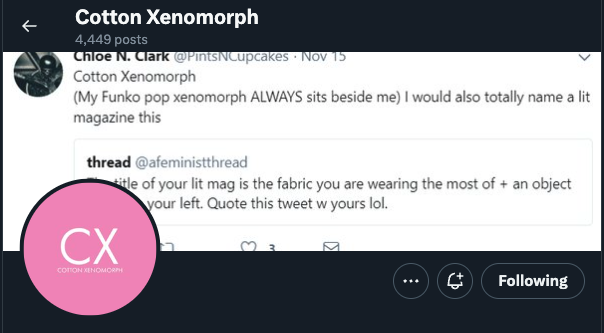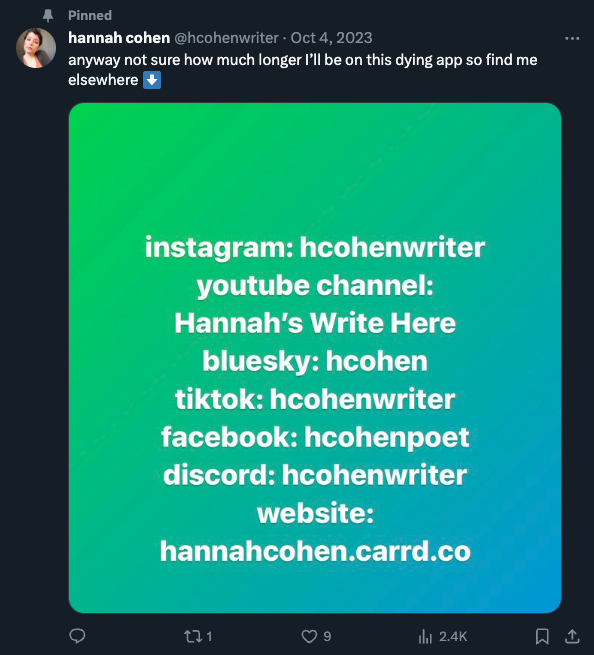I created my Twitter account in September 2015. I didn’t really know what to expect. I was an MFA candidate living in a less-than-literary city with three poetry publications under my belt. I had a subscription to Poets & Writers, but as a broke grad student looking for full-time employment, I didn’t have extra money to spend on subscribing to all the magazines that my professors and literary idols had published in. And that’s when it clicked for me: I could use Twitter. It was a text-based platform, so why not use it as a writer’s networking tool?

At first, I just posted pictures of poetry books I was reading. I would tweet words of praise for my favorite poets and their poems. I followed literary magazines on Twitter and created a list of places I wanted to submit to. I started DMing other writers and editors. I made wisecracks online, went semi-viral a handful of times for witty poetic tweets. More importantly, I was involved in a community of writers. I had Twitter friends I chatted with daily. And for a while, it was great.
I’m not exaggerating when I say that 90% of my publications (and my two chapbooks) were because of the personal connections I made on the platform. Because of Twitter, you didn’t even need an MFA or attend in-person conferences or workshops just to rub elbows. You could follow all your favorite literary journals on Twitter and see when there was an open call for submissions or contests. Admire a certain poet or essayist? Follow them on Twitter! Someone could go viral by sharing their poem or short story, and quite possibly land a book deal because the right publisher or editor saw the tweet. I personally benefited from editors soliciting me through Twitter DMs for creative work for their journals. Twitter was a career-changer for me. Most importantly, it was an accessible space that opened my world to the contemporary poets and writers around me; writers I would have never studied or read collections from were just a tweet away.
It’s why in the borrowed words of Percy Bysshe Shelley, Twitter’s gradual decline as a “colossal Wreck, boundless and bare” has been so painful to experience. My feed, once bustling with writerly news, unhinged drama, and submission calls, is now clogged with AI tech bros shilling for the latest plagiarism machine, weird ads for questionable products, and accounts freely posting bigoted remarks and parroting conspiracy theories. Sure, there were assholes and bullshit clickbait before Elon Musk bought the platform in 2022, but the amount of psychic damage I receive from navigating a broken algorithm is not worth even two minutes of scrolling just to see maybe see a new poem publication from one of my friends.

More importantly, I was involved in a community of writers."
I’d normally agree that spending less time online is a net-positive benefit, but this freedom came at the cost of losing one of the most invaluable assets of my writing life. I could add magazines to Twitter lists, and use it as a sort of database whenever they posted a submission call. I didn’t have to pay to play with the big lit kids. Editors and readers became more accessible, approachable even. Because of Twitter, writing could be less gatekeeper-y. If I had a question about the themes of a poetry collection, I could tweet or DM that poet. Because of a silly Twitter meme (it was something along the lines of “the name of your literary magazine is the fabric of the shirt you’re wearing + the item to the left of you), Cotton Xenomorph was birthed into existence, a literary magazine that is going on five years strong. Cotton Xenomorph published people who’ve gone on to land agents and book deals, published in major literary magazines, and we even published a former Pulitzer finalist.

The cover image shows the tweet where the zine's namesake was born.
Twitter didn’t just change my writing life, but my personal life as well: my now-boyfriend slid into my Twitter DMs, sending me a picture of the hummus he was eating and a photo of his cat. It was silly, really. But it worked. We embarked on a long-distance relationship for over a year. We closed the gap this past January after he moved 1,000 miles to be with me. With Twitter being so broken and cluttered, I do not think anyone signing up for an account now could find genuine connections in their personal or career sphere.
No social platform is without its specific brand of toxicity. Trust me, I’m a veteran of the LiveJournal and Tumblr years of the Internet. Even when I experienced targeted harassment and death threats on Twitter, I never left the platform. Twitter was never perfect, but it was manageable. Jack Dorsey is not without valid criticism of his time as CEO, including his decision to court Elon Musk as Twitter’s eventual buyer. Since October 2022, the extremely-divorced billionaire with poor business acumen and racist personal beliefs has made the overall user experience downright miserable with every passing day. Musk’s incompetence has destroyed a central hub of communication that so many creative people relied on not only for work, but for social connections. This type of authoritative technocracy isn’t limited to Twitter, lest we forget the role of Facebook in the 2016 election cycle, or Substack’s lack of moderation when it comes to Nazis publishing on their newsletter platform. Maybe it’s just my personal case of my sunken cost fallacy, but Twitter was more important to me than Facebook or Substack ever were or will be.
People have left Twitter for good. There are writers I don’t see or hear from anymore if I’m not already friends with them on Facebook, if I don’t follow them on Instagram, or if I don’t text them on a weekly basis. I don’t know who’s gotten book deals or new publications if I’m not actively interacting with them on another platform. There are writers I have already forgotten about as I type this essay, usernames and tiny profile pictures fading on the edges of my mind. Sure, I could maybe meet up with some folks at writing conferences like AWP or Sewanee, but those experiences cost money and time, time and money. Things I’m used to getting for free through Twitter.
In the post-Musk exodus, writers fled to apps like Mastodon, TikTok, YouTube, Bluesky, Instagram’s Threads, and Discord. Some writers have found varying success, but not everybody has the energy or time to reinvest in a shattered community. As modern social media pivots us to become both consumers and creators of endless video content, the forum boards and blogging platforms I grew up with no longer exist. The damage is done. In the search of absolute replacements, we’ve marooned ourselves on digital islands of our own making.

When a third space is no longer available, it becomes harder to connect with people outside of work and the home. Digital spaces should serve as that additional connection point, but even the Internet isn’t safe from corporate greed and shrinkage. The streaming model infects every aspect of our daily lives—there is always an option to “pay” out of seeing advertisements or access to supposedly premium features for basic services. Dedicated sites like Duotrope cost $5 a month to access their database and writer resources, and while that may be affordable to some writers, it’s not affordable for everyone. With stagnant wages and increased cost of living across the globe, subscribing to journal issues and paying contest fees is not financially sustainable for writers without a traditional literary background or immediate publishing connections. The gates that had once opened for writers from all corners are closing.
There’s a space on my iPhone that I call the “app graveyard,” reserved for apps I can’t quite delete, but don’t want appearing on my homescreen. The extra folder mostly consists of hotel apps, gas station reward apps, iPhone health apps, niche food delivery apps, and whatnot. But never did I think I would move Twitter, laughably rebranded as X, to this unwanted liminal space. I can’t bring myself to delete this app right now, but someday I will scroll through a littered, ad-cratered feed one last time, and it will be the last time.
The online literary community will persist despite the horrors of modern social media. Writer communities existed before the Internet through tight-knit local groups and meetups, word of mouth, and stapled pamphlets and zines (RIP Kinko’s). But that wasn’t my experience with the writing world.
Nothing will replace what I had on Twitter because nothing, frankly, will ever be Twitter again. Who knows what future conglomerate end-all app will cannibalize the competition, forcing everybody to exist and surveil one another. Some will thrive, some won’t. And when that time comes, I hope we’ve cultivated enough intentional connections to not only pursue our own writing goals, but to nurture one another. It’s not perfect, but I am trying.
____
Hannah Cohen received her MFA in Creative Writing from Queens University of Charlotte. Hannah is the author of two poetry chapbooks from Glass Poetry Press: YEAR OF THE SCAPEGOAT (2022) and BAD ANATOMY (2018). Hannah is one of the founding editors of the online literary journal Cotton Xenomorph. Publications include Poetry is Currency, Michigan Quarterly Review, Booth, Hey Alma, Pidgeonholes, Qu Lit Mag, The Offing, The Rumpus, Cherry Tree, Drunk Monkeys, and others. She was a Best of the Net 2018 finalist and a Pushcart Prize nominee.

